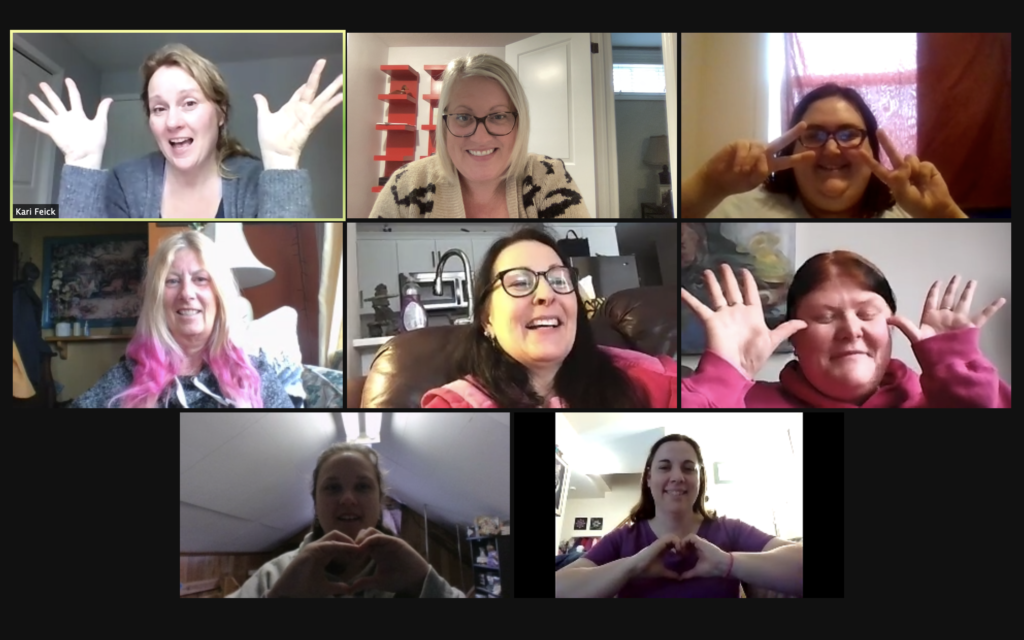 Executive Summary
Executive Summary
Many unemployed Canadians want to work but face complex social, economic and health challenges that make it difficult for them to re-enter the labour market, fueling a cycle of poverty. In response to these challenges, the Canadian Career Development Foundation (CCDF) developed In Motion & Momentum+ (IM&M+)—a pre-employability program to support individuals distant from the labour market—to address barriers to employment, build foundational skills and progress toward economic and social self-sufficiency. Delivered through three modules over 10 weeks, the program combines person-centred, strengths-based approaches with experiential learning to foster hope, resilience and confidence. Since its launch in New Brunswick in 2016 and its subsequent expansion to British Columbia, Alberta, Saskatchewan, Ontario and Newfoundland and Labrador, IM&M+ has been evaluated through a randomized controlled trial (RCT) to rigorously assess its causal impact on participant outcomes. Findings from the RCT demonstrate that compared to control groups, IM&M+ participants experience higher employment rates and significant improvements in pre-employability skills, including employment hope, emotional intelligence and mental health. High satisfaction rates highlight the program’s relevance and effectiveness, while ongoing insights inform adaptations for scaling and sustainability.
Key Insights
Employment rates increased by 34 percentage points for the program group compared to 22 percentage points for the comparison group over 12 months. Participants also showed statistically significant gains in employment hope, emotional intelligence and mental health.
Participants valued the facilitator support, peer interaction and structured, strengths-based approach, while facilitators appreciated CCDF’s resources and training.
The program achieved high fidelity across sites – meaning it was implemented as designed – with 85–98% of facilitators adhering to the designed delivery model.
 The Issue
The Issue
Many sectors in the Canadian economy are experiencing labour and skills shortages and are looking to coordinate efforts to attract new types of workers, including job seekers facing barriers.
Job seekers facing complex barriers to employment often experience unstable labour market attachment, leading to cycles of precarious work and reliance on social services. These barriers include long-term unemployment, limited education and insufficient supports for mental health and life stabilization.
Existing employment services typically assume people are employment ready and don’t address gaps in pre-employability skills.

 What We Investigated
What We Investigated
IM&M+ is testing a model that could help fill this gap. IM&M+ addresses these challenges by equipping participants with the skills, motivation and confidence needed to take sustainable steps toward employment or education, breaking the cycle of instability. Delivered through three modules over 10 weeks, the program combines person-centred, strengths-based approaches with experiential learning to foster hope, resilience and confidence.
CCDF received a grant from the Future Skills Centre to use a RCT to systematically and rigorously measure IM&M+’s causal impact on participant outcomes – that is, the direct effect the program has on participants, separating it from other influencing factors. The RCT involves 13 organizations in five provinces and compares outcomes of IM&M+ participants to other individuals with similar characteristics who are offered “business-as-usual” employment services.
The evaluation of IM&M+ seeks to assess its effectiveness in improving pre-employability skills, employment outcomes and social assistance reliance. For the RCT, participants were assigned to either the program or comparison group, enabling a robust causal analysis. Data collection included baseline, midpoint and follow-up surveys; administrative records; and interviews with participants and facilitators.
 What We’re Learning
What We’re Learning
By September 2024, 659 participants had consented to participate in the RCT across five cohorts, with survey response rates ranging from 43% to 84%.
IM&M+ effectively reaches its target demographic of individuals facing prolonged unemployment or precarious employment. Participants report significant gains in pre-employability skills, such as employment hope and emotional intelligence, as well as healthier behaviours. Employment rates increased from 12% at baseline to 46% at 12 months for program participants. The program also positively impacts mental health, though effects on resilience, self-esteem and locus of control — the extent to which individuals feel they have control over their own outcomes —remain small. Facilitators highlighted the program’s strengths in fostering participant confidence while noting challenges in transitioning participants to post-program supports and addressing life stabilization needs.
As to be expected with any program, IM&M+ experienced some minor implementation challenges. Working with diverse delivery partners across different geographic, economic and population contexts is a highly ambitious approach that reflects CCDF’s position as a capacity builder in the career development sector. This approach requires adaptation to the local context and clear communications around anticipated risks and expectations for service providers, along with responsive capacity-building supports. Despite these challenges, the program achieved high fidelity across sites, with 85–98% of facilitators adhering to the designed delivery model.
 Why It Matters
Why It Matters
Pre-employability programs like IM&M+ are essential for addressing systemic unemployment and fostering economic inclusion. By empowering participants with skills, confidence and clear pathways, IM&M+ contributes to workforce development, reduces reliance on social services and serves as a pathway to realize the potential of an under-engaged group of workers. Its scalable, community-based model demonstrates the potential for widespread impact across diverse contexts and populations.
Implementing an RCT while a program is being implemented by multiple delivery partners and scaled to various regions and contexts is a rare and significant undertaking for a community-based social program in the Canadian social services landscape. The final results from the study will help to demonstrate how IM&M+, as a strengths-based program, is directly impacting Canada’s gap in pre-employability services.

State of Skills:
Digital Tools in the Skills Ecosystem
There is considerable promise in the role digital tools and virtual career services can play in improving access to training and career development, particularly for those with geographic barriers or constraints such as family care or other work responsibilities.
 What’s Next
What’s Next
A forthcoming final report will include data from the final 2024 cohort and an expanded analysis of impacts on subgroups, including newcomers and individuals with disabilities. The report, due in fall 2025, will also examine correlations between module completion and outcomes, conduct a cost-effectiveness analysis, and provide insights into scaling IM&M+ to additional regions and demographics.
Have questions about our work? Do you need access to a report in English or French? Please contact communications@fsc-ccf.ca.
More from FSC
Employment in 2030: Action labs
Impact of remote work on engineering and technology jobs
Bridging the skills gap within small and medium-sized enterprises in Quebec: An analytical and empirical analysis
How to Cite This Report
Kenyon, M., McDonough, L. (2024) Project Insights Report: In Motion & Momentum+ (IM&M+) – Building Resilience, Hope and Sustainable Futures. Toronto: Future Skills Centre. https://fsc-ccf.ca/projects/imandm/
In Motion & Momentum+ (IM&M+) is funded by the Government of Canada’s Future Skills Program. The opinions and interpretations in this publication are those of the author and do not necessarily reflect those of the Government of Canada.




